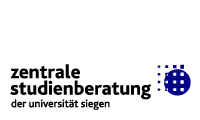Zentrale Studienberatung
im F-S Gebäude
Sandstraße 16-18
57072 Siegen
Erreichbarkeit der
studentischen Hotline:
0271 740-2712
Mo - Do: 9 - 16 Uhr
Fr: 9 - 12 Uhr
Mail:
info.studienberatung[at]
zsb.uni-siegen.de
Terminvereinbarung für eine Beratung über:
0271 740-2712
International Students
You find information about the admission procedure here:
STARTING
Impressum
Philosophy

Short Information
| Restricted
admission |
Regular
study time |
Winter
semester |
Summer
semester |
|---|---|---|---|
| no | 4 semester/
8 semester (part time) |
✔ | ✔ |
Admission procedure
Application required
You can apply here
Degree
Master of Arts
More information
Language of instruction
German
Deadlines
The degree program
Reinforcing philosophical knowledge and skills are taught in this Master's degree program, since the teachers of this subject link outstanding research to internationally connected and recognized research focuses, such as philosophical gender research, philosophy of language or in the area of philosophy of time, Hans Jonas or Kant research.
Students profit from a wide-spread study offer with focuses on cognitive science, philosophy of the mind, ontology, practical philosophy, and history of philosophy. The abilities of analysis and interpretation of texts, critical reflection, argumentation, and problem solving are reinforced here. The regular lectures, colloquiums and exclusions also give students insights into current international research debates.
The M.A. Philosophy can be studied as major or minor subject and offers the following modules:
- M 1 : History of Philosophy and Cultural Philosophy
- M 2 : Issues of theoretical philosophy
- M 3 : Issues of practical philosophy
- M 4 : Self-studies
- M 5 : Extension module
- M 6 : Research module
Especially through the Self-studies-module students develop their ability of independent learning and research. In the Research module students participate in a philosophical colloquium that enables intensive discussions of others’ and their own research approaches. Intensive and individual support by the professors and their employees is ensured by the beneficial relation of students and teachers.
The studies provide ideal preparation for postgraduate studies in the subject of Philosophy or work in other areas connected to philosophy. This includes in particular publishing, journalism, personnel management, media, public and private facilities of science administration and organizations or institutions of education and further education. Additionally, the Master's degree program, in combination with other qualifications, prepares for work in facilities of education and science management (libraries, archives, museums or institutes).
Can be studied as…
The Master’s degree program in Philosophy can be studied as a major course subject or a minor course (Model B). Further information can be found on the website of the Faculty of Arts and Humanities.
Admission requirements
To be admitted to the Master's degree program in philosophy, one must have
- a Bachelor of Arts degree in a relevant subject or
- a degree of an equivalent degree program in philosophy.
Relevant subjects are philosophical main and secondary study programs. A degree program is also considered to be subject-relevant if philosophical knowledge from the areas philosophical basic skills, practical philosophy and theoretical philosophy is proven to the extent of a total of 45 credit points (LP). Students who have completed at least 36 credit points can take an additional module (from the modules offered in the Bachelor of Philosophy) worth 9 credit points.
The examination regulations relevant at the time shall apply.
Study organization
Subject examination regulations including study plans and module descriptions
The Framework Examination Regulations (RPO-M) and the general subject-specific regulations of the subject examination regulations (PHIL-FPO-M) define the general regulations of studying in Siegen and at the Faculty of Arts and Humanities.
In addition, the subject examination regulations of the individual (partial) degree programs (FPOs) define the basic structures of a (partial) degree program (e.g. admission requirements and content to be studied). The examination regulations are accompanied by curricula, which represent the recommended exemplary course of study in the individual subjects, as well as module descriptions (content-related information on modules).
Students are automatically subject to the current version of an FPO when they enroll for their first semester.


